- Home
- Janice Kay Johnson - His Best Friend's Baby
The Man Behind the Cop
The Man Behind the Cop Read online
“If I asked you to dinner,
would you say yes?”
Karin hadn’t felt a clutch of excitement like this in years. She made a point of not dating men who were as steeped in the violent underside of human nature as she was. But standing here with Bruce in front of her, she had the oddest flash of revelation. How had she expected to fall in love with someone she couldn’t talk to?
She must have been quiet for too long, because Bruce continued, “If my asking makes you uncomfortable, say so. We’ll consider the subject closed.”
“Yes,” she said. “I mean, no. I mean…”
He stopped and faced her. Around them, the garage was brightly lit and yet somehow shadowy. They were very much alone.
“Yes? Or no?”
“Yes,” she whispered. “I’d say yes.”
There was that look in his eyes again, the one that seemed to liquefy her…
Dear Reader,
I have a tendency to be critical of my own writing. I’m not one of those authors who weeps with her characters, can hardly bear to let them go at the end of the book, and so on. I’m usually sure the book is lousy until I do the last read-through and am pleasantly surprised to find that it really works after all. (You’d think I would learn, wouldn’t you?)
But I fell in love with Detective Bruce Walker early in the writing. Once in a while, one of my own heroes comes to life in a way I can’t quite take credit for. He believes that inside him is a well of violence he never dares tap; he structures his life so that he won’t end up like his abusive father. Although he proves day in and day out on the job that he’s compassionate, courageous and kind, he never quite believes it. At its heart, this book is about one man, and what happens when he meets the woman who forces him to confront his ghosts and look squarely at himself. I hope you’ll find his journey as wrenching as I did, and that you, too, will love a tormented, sexy hero who battles to be a decent man.
Sincerely,
Janice Kay Johnson
THE MAN BEHIND THE COP
Janice Kay Johnson
TORONTO • NEW YORK • LONDON
AMSTERDAM • PARIS • SYDNEY • HAMBURG
STOCKHOLM • ATHENS • TOKYO • MILAN • MADRID
PRAGUE • WARSAW • BUDAPEST • AUCKLAND
ABOUT THE AUTHOR
Janice Kay Johnson is the author of sixty books for adults and children. She has been a finalist for a Romance Writers of America RITA® Award four times for her Harlequin Superromance novels. A former librarian, she’s also worked at a juvenile court with kids involved in the foster care system. She lives north of Seattle, Washington, and is an active volunteer and board member of Purrfect Pals, a no-kill cat shelter.
Books by Janice Kay Johnson
HARLEQUIN SUPERROMANCE
998—HIS PARTNER’S WIFE†
1009—THE WORD OF A CHILD†
1040—MATERNAL INSTINCT†
1092—THE GIFT OF CHRISTMAS
“Undercover Santa”
1140—TAKING A CHANCE††
1153—THE PERFECT MOM††
1166—THE NEW MAN††
1197—MOMMY SAID GOODBYE
1228—REVELATIONS
1273—WITH CHILD
1332—OPEN SECRET**
1351—LOST CAUSE**
1383—KIDS BY CHRISTMAS
1405—FIRST COMES BABY
1454—SNOWBOUND
HARLEQUIN SINGLE TITLE
WRONG TURN
“Missing Molly”
HARLEQUIN ANTHOLOGY
A MOTHER’S LOVE
“Daughter of the Bride”
SIGNATURE SELECT SAGA
DEAD WRONG
HARLEQUIN EVERLASTING LOVE
21—CHRISTMAS PRESENTS AND PAST
CONTENTS
ABOUT THE AUTHOR
CHAPTER ONE
CHAPTER TWO
CHAPTER THREE
CHAPTER FOUR
CHAPTER FIVE
CHAPTER SIX
CHAPTER SEVEN
CHAPTER EIGHT
CHAPTER NINE
CHAPTER TEN
CHAPTER ELEVEN
CHAPTER TWELVE
CHAPTER THIRTEEN
CHAPTER ONE
“I’M GOING TO LEAVE HIM.” Determination was stark on Lenora Escobar’s face, but her hands, clenched on the arms of the chair, betrayed her anxiety.
Karin Jorgensen felt a thrill of pleasure, not so much at the statement but at how far this terrorized woman had come to be able to make it. Yet Karin’s alarm bells also rang, because the days and weeks after leaving an abusive man were the most dangerous time for any woman.
The two sat facing each other in Karin’s office, a comfortable, cluttered space designed to allow children to play and women to feel at home. For almost five years now, Karin had been in practice with a group of psychologists at a clinic called A Woman’s Hand, which offered mental health services only to women and children.
She remembered having a vague intention to go into family counseling. By good fortune, an internship here at A Woman’s Hand had presented itself while she was in grad school, and she’d never looked back. Women like Lenora were her reward.
Lately, she’d begun to worry that she went way beyond feeling mere job satisfaction when her clients took charge of their lives. She’d begun to fear they were her life. Their triumphs were her triumphs, their defeats her defeats. Because face it—her life outside the clinic was…bland.
Annoyed by the self-analysis, she pulled herself back to the present. Focus, she ordered herself. Lenora needed her.
“Are you sure you’re ready for this step?” she asked.
Lenora’s thin face crumpled with a thousand doubts.
“Don’t you think I am?”
Karin smiled gently. “I didn’t say that. I’m just asking whether you’re confident you’re ready.”
Two years almost to the day had passed since Lenora Escobar had come for her first appointment. In her early thirties and raising two young children, she had virtually no self-esteem. Virtually no self. She had come, she’d said, because her husband was so unhappy with her. She needed to change.
She’d made only three or four appointments before she disappeared for six months. When she returned, her arm was in a sling and her face was discolored with fading bruises. Even then she made excuses for him. Of course it was wrong for him to hurt her, but…She should have known better than to say this, do that. To wear a dress he didn’t like. To let the kids make so much noise when he was tired after work. Only recently had she declared, “I don’t want to be afraid anymore. I don’t think he’ll change.”
In Karin’s opinion, Roberto Escobar was a class-three abuser, a man as incapable of empathizing with another human being as he was of real love or remorse. Rehabilitation for this kind of offender was impossible. His need to control his wife and children would only escalate; his violence would become more extreme. If she didn’t leave him, the odds were very good that eventually he would kill Lenora or one of the children.
Not that leaving him brought her any certainty that she would be safe. He had told her from their wedding night on that he would kill her if she ever tried to leave him. Lenora had once confessed she was flattered when he’d first said that. “He was so passionate. He told me I was his whole world.”
Now she said, “I know I have to go. I guess I’m scared. I’ll have to find a job, even though I’ve never worked. He’ll be so angry…” She shivered. “But I have put a plan in place, like you advised.” She talked about the safe house where staff already expected her, about the possessions she’d been sneaking out over the course of several weeks in case she had to go suddenly.
“That took cour
age,” Karin said with approval.
“I was so afraid he’d notice when I had something tucked under my shirt or my purse was bulging! But he never did.”
“How did you feel about keeping that kind of secret from him?”
“The truth?” Her face relaxed. “I felt good. Like a kid with a secret from her sister. You know?”
Karin laughed. “I do. Powerful.”
“Right! Powerful.” Lenora seemed to savor the word. When had she ever been able to think of herself as powerful? “I’ve been looking at him and counting off the days. Thursday is payday and he always gives me money for groceries. I’ve been stowing some away, but a couple hundred more would be nice. So I’m going to leave Friday.”
Karin nodded. “Enough for a month’s rent would be great.”
“But I feel I should tell him I’m going, not just disappear. After fifteen years of marriage, I think it’s the least I owe him. If I had somebody there with me…”
Karin straightened in her chair. “You know how dangerous confronting him could be.”
Lenora bit her lip. “Yes.”
“Why do you feel you ‘owe’ Roberto?”
Lenora floundered, claiming at first that owe probably wasn’t the best choice of word.
“Since I’ve never worked, he has brought home all the money.”
“You’ve talked about how you would have liked to work.”
She nodded. “If I’d had a paycheck of my own…”
Karin finished for her. “You would have felt more independent.”
Lenora gave a small, painful smile. “He didn’t want me to be independent.”
Karin waited.
“You don’t think I should tell him face-to-face?”
Usually, Karin let clients work their way to their own conclusion, but in this instance she said, “No. I don’t think Roberto will let you walk out the door. If you have someone with you, that person will be in danger, as well. And where will the children be? What if he grabs Anna and Enrico and threatens to hurt them?”
Just audibly, Lenora confessed, “I would do anything he asked me to do.”
Karin waited again.
“Okay. We’ll sneak away,” Lenora said.
“I really believe that’s smart.”
The frail woman said, “He’ll come after me.”
“Then you have to make sure neither you nor the children are ever vulnerable.”
“I wish we could join the witness protection program or something like that.”
“Just disappear,” Karin said. The ultimate fantasy for a woman in Lenora’s position.
Lenora nodded.
“But then you’d never see your aunt and uncle or sister again,” Karin pointed out.
“They could come, too.”
“Along with your sister’s children? And her husband? What about his family?”
Lenora’s eyes filled with fears and longings. “I know that can’t be. But I wish.”
“You realize you’ll have to stay away from your family and friends for now. He’ll be watching them. But if you can stay safe long enough, he’ll lose interest.”
Lenora agreed but didn’t look convinced. And as scared as she had to be right now, who could blame her?
When the hour was over and Karin was walking her out, Karin asked, “Will you call me once you’re at the safe house?”
“Of course I will.” In the reception area, furnished like a living room, Lenora hugged her. “Thank you. You’ve helped me more than you can imagine.”
Touched, Karin hugged her back. “Thank you.”
Lenora drew back, sniffing. “I can keep coming here, can’t I?”
“As long as you’re sure he’s never known about A Woman’s Hand. Remember, you can’t do anything predictable,” Karin reminded her.
“He’s never heard about this place or about you.” Lenora sounded sure.
“Great. Then I’ll expect you next Tuesday. Oh, and don’t forget that Monday evening we’re having the first class in the women’s self-defense course. It would be really good for you.”
They’d talked about this, too—how the course wasn’t geared so much to building hand-to-hand combat skills as it was to changing the participants’ confidence in themselves and teaching preparedness.
Lenora nodded. “I mentioned it to the director at the safe house, and she said she’d drive me here. She told me I could leave Enrico and Anna there, that someone would watch them, but I think I’d rather bring them. You’ll have babysitting here, right?”
“Absolutely.” Karin smiled and impulsively hugged her again. “Good luck.”
She stood at the door and watched this amazing woman, who had defied her husband’s efforts to turn her into nothing, hurry to the bus stop so she could pick up her children and be home before he was, ready to playact for three more days.
Karin seldom prayed—her faith was more bruised than her most damaged client’s. But this was one of those moments when she gave wing to a silent wish.
Let her escape safely. Please let her make it.
The blue-and-white metro bus pulled to a stop, and Lenora disappeared inside it. With a sigh, Karin turned from the glass door. She had five minutes to get a cup of coffee before her next appointment, this one a fifty-eight-year-old rape survivor who’d been left for dead in the basement of her apartment building when all she’d done was go down to move her laundry from the washer to the dryer.
In the hall, Karin slowed her step briefly when she heard a woman sobbing, the sound muffled by the closed door to another office. Maybe they should have called the clinic A Woman’s Tears, they ran so freely here.
Sometimes she was amazed that of the five women psychologists and counselors in practice here, three were happily married to nice men. She was grateful for the reminder that kind, patient men did exist. They might even be commonplace and not extraordinary at all. In the stories—no, the tragedies—that filled her days, men were the monsters, rarely the heroes.
She shook her head, discomfited by her own cynicism. This path she now walked wasn’t one she’d set out on because she’d been bruised from an awful childhood or an abusive father. True, her parents had divorced, and she thought that was why she’d aimed to go into family counseling, as if the child inside her still thought she could mend her own family. But her dad was a nice man, not one of the monsters.
She couldn’t deny, though, that the years here had changed her, made her look at men and women differently. She dated less and less often, as if she’d lost some capacity to hope. Which was ironic, since she spent her days trying to instill hope in other women.
In the small staff lounge, she took her mug from the cupboard.
Shaking off the inexplicable moment of malaise, she thought again, Please let Lenora make it. Let this ending be happy.
“MAN, I WISHI could shoot from the free-throw line.” Grumbling, the boy snagged the ball that had just dropped, neat as you please, through the hoop.
The net itself was torn, the asphalt playground surface cracked, but playing here felt like going back to the roots of the game to Bruce Walker, who waggled his fingers. “Still my turn.”
Trevor bounced the basketball hard at him. “It’s not fair.”
They argued mildly. The game of horse was as fair as Bruce could make it, handicapping himself so that he shot from much farther out. He pointed out that he was six feet three inches tall and had been All-Southern California in high-school basketball.
“Whereas you,” he said, “are twelve years old. You’ve developed a dandy layup, and you’re quick. One of these days, you’ll start growing an inch a week. Kid you not.”
“An inch a week!” Trevor thought that was hysterical.
Bruce guessed the idea held appeal for Trevor because it transformed him into a superhero. He was at that awkward age when most boys were physically turning into young adolescents, developing muscles, growing hair. In contrast, Trevor could have been ten years old. He wasn’t much over fiv
e feet tall, and so skinny even his elbows were knobby. His voice wasn’t yet cracking, or even deepening. He wanted to be a man, and didn’t even look like an adolescent.
Yeah, tough age.
Bruce, a homicide detective with the Seattle Police Department, had volunteered to be a Big Brother and had been paired with Trevor DeShon a year ago. He’d made the decision to offer his time as a form of payback. A cop had befriended him as a kid, making a huge difference in his life. What went around came around, Bruce figured.
Trev’s mother had struggled to keep them in an apartment after Trevor’s father was arrested for domestic violence. Her jaw had been wired shut for weeks after that last beating.
His dad had never hit him, Trev said, but that was because his mom always signaled him to go hide when Dad walked in the door drunk and in a bad mood. He’d huddle in his room, listening to his parents scream at each other, and would later get bags of frozen peas or corn to put on his mom’s latest shiner.
Bruce didn’t want Trevor growing up to be just like his dad, or turning to drugs like his mom. Maybe Bruce, by being a role model, showing Trevor there was a different kind of life out there than what he saw at home and in his rough neighborhood, could change what would otherwise be an inevitable outcome.
What Bruce hadn’t expected was to worry about the kid as much as he did.
After the game of horse, they practiced layups and worked on Trevor’s defensive moves, after which Bruce let him pick where to go for dinner.
That always meant pizza. Their deal was they both had a salad first so they got their vegetables. Bruce pretended not to notice how much cheese the boy put on his.
They did their best talking while they ate. Tonight, Bruce asked casually, “You heard from your dad lately?”
Trev shrugged. “He called Saturday. Mom wasn’t home.”
Mom would have hung up on him, Bruce knew. Trevor hadn’t seen his father in two years, although the guy had tried to maintain contact, Bruce had to give him that.

 Home Deadly Home
Home Deadly Home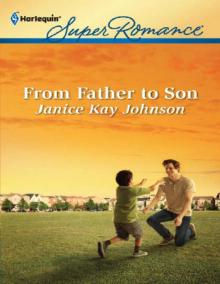 From Father to Son
From Father to Son All the Lost Little Horses (A Desperation Creek Novel Book 2)
All the Lost Little Horses (A Desperation Creek Novel Book 2) Hide the Child
Hide the Child Within Range
Within Range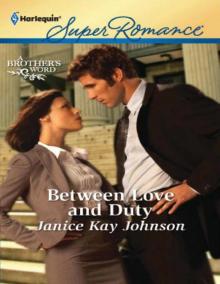 Between Love and Duty
Between Love and Duty First Comes Baby
First Comes Baby Charlotte's Homecoming
Charlotte's Homecoming In A Heartbeat (HQR Superromance)
In A Heartbeat (HQR Superromance)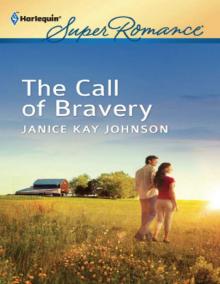 The Call of Bravery
The Call of Bravery In Hope's Shadow
In Hope's Shadow Anything for Her
Anything for Her Harlequin Superromance September 2014 - Bundle 1 of 2: This Good ManPromises Under the Peach TreeHusband by Choice
Harlequin Superromance September 2014 - Bundle 1 of 2: This Good ManPromises Under the Peach TreeHusband by Choice The Baby Agenda
The Baby Agenda More Than Neighbors
More Than Neighbors Her Amish Protectors
Her Amish Protectors All That Remains
All That Remains Whisper of Revenge (A Cape Trouble Novel Book 4)
Whisper of Revenge (A Cape Trouble Novel Book 4) In a Heartbeat
In a Heartbeat A Mother's Claim
A Mother's Claim Because of a Girl
Because of a Girl Back Against the Wall
Back Against the Wall Dangerous Waters
Dangerous Waters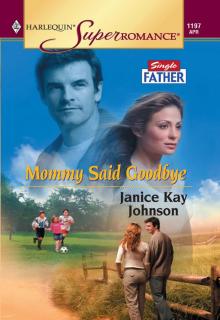 Mommy Said Goodbye
Mommy Said Goodbye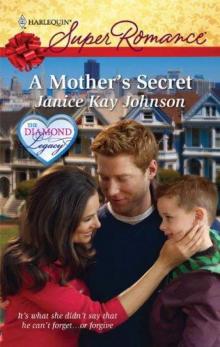 A Mother's Secret
A Mother's Secret See How She Runs (A Cape Trouble Novel Book 2)
See How She Runs (A Cape Trouble Novel Book 2) Plain Refuge
Plain Refuge Bringing Maddie Home
Bringing Maddie Home For the Girls' Sake
For the Girls' Sake Through the Sheriff's Eyes
Through the Sheriff's Eyes Yesterday's Gone (Two Daughters Book 1)
Yesterday's Gone (Two Daughters Book 1) All a Man Is
All a Man Is Harlequin Superromance January 2014 - Bundle 1 of 2: Everywhere She GoesA Promise for the BabyThat Summer at the Shore
Harlequin Superromance January 2014 - Bundle 1 of 2: Everywhere She GoesA Promise for the BabyThat Summer at the Shore No Matter What
No Matter What Wakefield College 01 - Where It May Lead
Wakefield College 01 - Where It May Lead Someone Like Her
Someone Like Her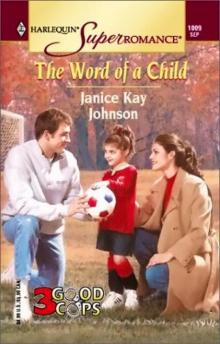 THE WORD OF A CHILD
THE WORD OF A CHILD Harlequin Superromance May 2016 Box Set
Harlequin Superromance May 2016 Box Set Open Secret
Open Secret The New Man
The New Man Finding Her Dad
Finding Her Dad The Perfect Mom
The Perfect Mom All Through The House
All Through The House Match Made in Court
Match Made in Court Making Her Way Home
Making Her Way Home From This Day On
From This Day On To Love a Cop
To Love a Cop The Hero's Redemption
The Hero's Redemption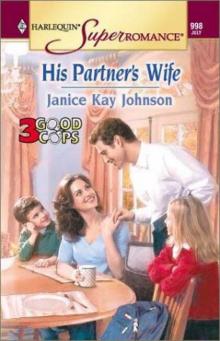 HIS PARTNER'S WIFE
HIS PARTNER'S WIFE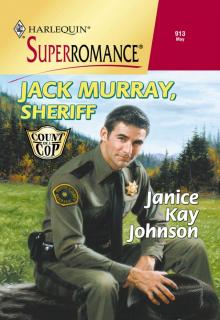 Jack Murray, Sheriff
Jack Murray, Sheriff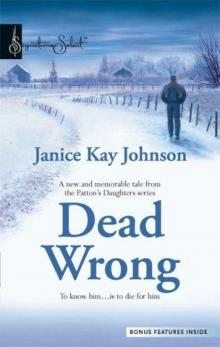 Dead Wrong
Dead Wrong Twisted Threads (A Cape Trouble Novel Book 3)
Twisted Threads (A Cape Trouble Novel Book 3) Bone Deep
Bone Deep The Closer He Gets
The Closer He Gets With Child
With Child Whose Baby?
Whose Baby? Kids by Christmas
Kids by Christmas